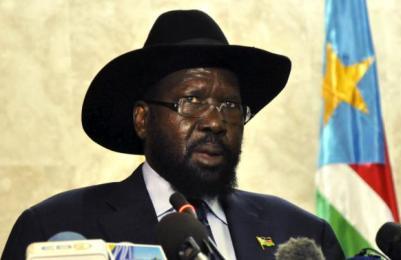South Sudan president vows commitment to peace deal amid fears of collapse
November 27, 2015 (JUBA) – South Sudanese president, Salva Kiir, on Friday reaffirmed his personal commitment and his administration to fully implement the peace agreement he signed in August with his former deputy, Riek Machar, despite fears that renewed fighting between members of their forces could lead to the collapse of the deal if no actions are taken.

Lueth who received the former detainees accompanied by Rebecca Nyandeng de Mabior assured the returning officials that the president who was away on a mission to Kampala when the former detainees arrived, was committed to the peace deal.
“The president has ultimately taken very difficult but bold decision to reaffirm his personal and commitment of the government to fully implement the peace agreement. Because of this we welcome the coming of the former detainees and their participation in the opening and the operationalization of the office of the joint monitoring and evaluation commission,” Lueth told reporters and also in a statement to the state owned South Sudan Television (SSTV) on Friday before the opening of the function.
This comes after the head of the ceasefire monitors in the country issued a statement on Thursday urging warring forces to stop fighting amid growing international fears a key peace deal is close to collapse.
Fighting in the nearly two-year long war has raged on despite the August peace agreement.
Festus Mogae, former Botswana president who heads the Joint Monitoring and Evaluation Commission (JMEC), set up by the regional IGAD-bloc to ensure the peace deal is implemented told participants of the meeting on Friday that the war has caused so much suffering to the people of the country.
He said he was very sad when he saw the state of the condition in which members of the internally displaced persons had continued to live while the leaders continued to show no remorse for their suffering.
“The agreement offers the way forward for a peaceful South Sudan. I urge the parties to accelerate the implementation process,” the former president of Botswana told reporters in Juba, adding he was deeply concerned at “continued fighting” in northern Unity state.
The United States, Britain and Norway, key backers of the peace process, have warned the deal could collapse if the rivals continue to miss deadlines.
“Each day, the fighting and abuses continue, and an already grave humanitarian situation grows worse,” a joint statement late Wednesday reads, adding “We urge South Sudan’s leaders to establish the transitional government now and recommit to the timeline of the agreement, or the peace process will unravel.”
The opposition faction (SPLM-IO) led by the first vice-president designate, Riek Machar, however said recent attitude of president Kiir’s government which unilaterally created 28 states in violation of the peace agreement made it impossible for the agreement to implement in time.
Civil war began in December 2013 when president Kiir accused his former deputy Machar of planning a coup, setting off a cycle of retaliatory killings that have split the poverty-stricken, landlocked country along ethnic lines.
An African report released last month however dismissed government’s claims that there was coup attempt and also said the massacre of members of the ethnic Nuer civilians in Juba in December 2013 was a state policy.
UN secretary-general, Ban Ki Moon, this week warned that the broken ceasefire and failure to meet deadlines cast doubt on the “commitment to the peace process.”
Ki Moon said “grave violations” against children continue — including killing, rape, maiming and child soldier recruitment — while “sexual violence remains a key feature” of the war.
“Rape, gang rape, abduction, sexual slavery, forced abortion and mutilation of women’s bodies have been perpetrated by all sides,” he said in the report.
The conflict has triggered a humanitarian crisis with 2.3 million people forced from their homes and 4.6 million in need of emergency food. Tens of thousands have died and the economy is in ruins.
(ST)
